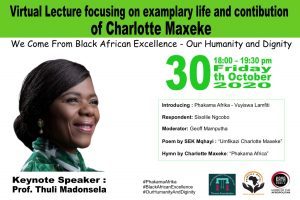Remembering forgotten hero, Nyakane Tsolo from the Sharpeville Massacre
David O’Sullivan
This past weekend, we marked Human Rights Day and remembered the 61st anniversary of the Sharpeville massacre.
The photograph below was taken 61 years ago today in Sharpeville. It was taken about 90 minutes before police at the Sharpeville police station opened fire on a group of Pan Africanist protesters, who had gathered to protest against the hated pass laws, resulting in one of the bloodiest and most significant events in South Africa’s turbulent political history.
The young man on the left of the photograph should be remembered for his important role that day. Sadly, history has forgotten him and there are no memorials to him, no schools nor streets named after him. His name is Nyakane Tsolo.

Tsolo was a laborer at African Cables, who had left school in Standard 8 (Grade 10). He became a trade unionist at the age of 20 and, despite his youth, was good at mobilising people. He helped set up the Sharpeville branch of the PAC and was its secretary.
On the 21st of March, Tsolo played a prominent role in organising protestors to gather at the Sharpeville police station from early in the morning as part of the planned nationwide anti-pass protest. The PAC leader Robert Sobukwe was leading protesters in Soweto at the same time.
The photograph of Tsolo was taken by Drum photographer Ian Berry sometime between 12h00 and 13h00. It was published in Bishop Ambrose Reeves’s book “Shooting at Sharpeville”.
The photographs were printed in the sequence in which they were taken and the crowd appears peaceful, as witnesses later told the commission of inquiry into the massacre. The caption of the photograph did not identify Nyakane Tsolo.
A time for reflection
Three years ago, I broadcast my Kaya 959 radio show from Sharpeville and interviewed numerous survivors. As they looked through the photographs in my copy of Reeves’s book, they excitedly pointed at the image of the beaming young man and confirmed it was Nyakane Tsolo. The caption reads: “This is what the police described as an armed mob. One man has a stick and there are a few umbrellas”.
By 12h00, an estimated 3 000 people were standing outside the Sharpeville police station. Tsolo tried to negotiate with the police, demanding to be arrested at which point he would instruct the crowd to disperse. The officer commanding the police station, Sergeant Wessels, refused to arrest him and his colleagues, saying he had no authority and, in any event, there was no room in the cells.
For Tsolo, the PAC campaign was supposed to be a continuous series of protests in which people would openly defy the law and be arrested. He had said if the police had simply arrested him and his colleagues, the crowd would have moved off.
In Tom Lodge’s book Sharpeville: an apartheid massacre and its consequences, Lodge quotes a witness at the commission of inquiry describing Tsolo as having “the whole crowd in the palm of his hand because whenever he raised his hand, it enveloped the whole crowd, he would raise his hand for silence and for Africa.”
At around 13h00, Nyakane Tsolo tried again to talk to the police. By now, a senior officer, Colonel “Att” Spengler, a notorious policeman, had arrived. Spengler wanted the PAC men to call off the protest, failing which the police should open fire over their heads. His colleague Lieutenant-Colonel G.D. Pienaar wanted the police to shoot into the crowd.
Yet again Tsolo tried to defuse the situation by negotiating with the police about arresting him. He attempted to talk to Spengler, who cut him short and ordered him to tell the crowd to back off. Tsolo refused, saying only Sobukwe had such authority.
The short-tempered Spengler promptly arrested Tsolo – something he had been demanding all morning. More PAC men stepped forward demanding to be arrested. As the crowd surged forward, stones were thrown at the police. Lt-Col Pienaar had ordered the police to load their weapons and wait for his order. Suddenly, without warning, the gunfire started. 168 policemen fired 1 344 rounds of ammunition into the crowd, killing 69 people and wounding 180.
Tsolo was quickly locked up. Police raided his house that evening but found nothing of importance. He was held at the Fort for a year, and was brutally tortured by the security police. After a year, he appeared in court along with a small group of other PAC leaders charged with incitement and public violence. He was granted bail and promptly fled to Maseru in Lesotho where a small group of PAC supporters tried to set up a new headquarters.
Later he made his way to Cairo where he received military training from the Egyptian special forces. He then lived in East Germany and later in Rotterdam in the Netherlands where he worked as a PAC representative with local anti-apartheid organisations. He returned home briefly in 1991 for a visit. He was a candidate for the PAC in the 1994 elections, but remained in Rotterdam before coming home permanently in 2001. He died a year later from a stroke.
His efforts on the morning of Monday 21st of March 1960 to negotiate a peaceful settlement to the protests outside the Sharpeville police station are largely forgotten. Tsolo lived long enough to see the memorial being unveiled near the police station (now a community centre), and he would have seen that his contribution on the day of the massacre was barely mentioned.
Written by: Natasha
Similar posts
MORE ARTICLES

ANC Youth League demands justice for Sindiso Magaqa beyond hitman’s conviction

Liverpool FC vows to pay out Diogo Jota’s R350 million contract to his widow

The World Show with Nicky B broadcasts live from France

Sindiso Magaqa assassin handed an 85-year sentence

Skhumba, Kgomotso and Glen weigh in on reincarnation
QUICK LINKS
UpComing Shows

The Best T in the City
With T Bose
He has held it down in the world of mid-morning radio with the best music, riveting topics, brilliant mixes and interesting guests. Every weekday, The Best T proves why he is the BEST by connecting to you like only your bro or favourite uncle could. He lets his listeners dictate the songs they want to hear in the ever-popular Top 10 at 10, and his Three Teaspoons never run out. Catch The Best T in the City Mondays to Fridays from 09h00 to 12h00.
close
Feel Good
With Andy Maqondwana
Feel good about feeling good! That's exactly what The Feel-Good show is about. An escape from the negativity that surrounds us, indulging you in good feels. Pass it on to one and all. Spread the good feeling around Gauteng with Andy Maqondwana.
close
Kaya Biz
With Gugulethu Mfuphi
The world of business is simplified for you by Kaya Biz with Gugulethu Mfuphi. This fast-paced award-winning business show talks to the corporate giants as well as up and coming entrepreneurs about their wins and challenges. Gugulethu invites guests to offer their analyses of markets and economies, and also delves into issues of personal financial wellness. Kaya Biz airs Mondays to Thursdays 18h00 to 19h00.
close
Point of View
With Phemelo Motene
Point of View with Phemelo Motene delves into the day’s current affairs, touches on real issues that affect people’s daily lives and shares expert advice on questions posed by the audience. Mondays to Thursdays 20:00 to 22:00.
closeConnect with Kaya 959
DownLoad Our Mobile App
© 2025 Kaya 959 | On The Street On The Air











